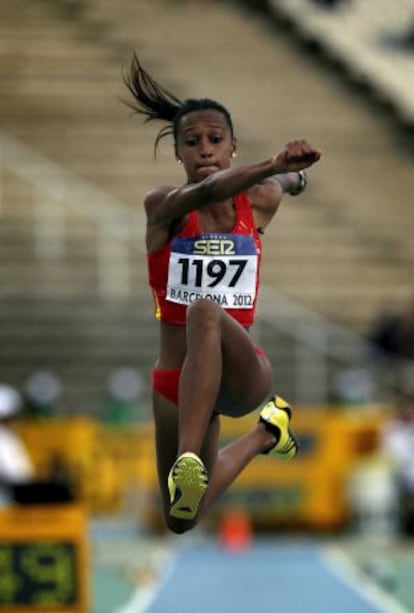A giant leap for Spanish athletics
Galician triple jumper shines at World Junior Championships

Spanish athletics was in something of a funk after the disappointing results achieved at the European Championships in Helsinki; just four medals, one of them gold, although the team was shorn of some notable names through injury.
It was hoped that the Spain team dispatched to the World Junior Championships would take up the baton and lift spirits a little with the Olympic Games just around the corner. As it transpired, Spain won just one medal in Barcelona. But the manner in which it was achieved has sent hopes soaring for the future of the triple jump, at least.
Ana Peleteiro, a 16-year-old from Galicia, leapt a staggering 14.17 meters to be proclaimed world junior champion and the same jump was the third-longest in Spanish history. To put it in wider context, had Peleteiro managed the same distance in Helsinki she would have finished in the top 10. She would also have achieved the same result at the 2008 Olympic Games. A shame, then, that although her 14.17 effort was comfortably above the minimum Olympic A standard, it was a few days over the deadline for the 2012 Games. Peleteiro, though, has a career as long as her legs; she already measures 1.71 meters and will continue to grow, according to the Spanish Athletics Federation (RFEA).
Coached at an athletics club in Galicia owned by the Moure family in a small village in A Coruña, far removed from the Blume high performance center outside Madrid, Peleteiro is fast, flexible and "very good technically," says Ramón Cid, a former triple jumper and now the head coach in the discipline at the RFEA.
Spain has not pocketed a track and field medal since 2004
"She has excellent posture because she has a high center of gravity and is able to adjust very well, which allows her to jump up to 40 centimeters further than her peers," adds Abelardo Moure, who has guided Peleteiro since she was four years old when she decided to take athletics seriously. In 2011, she was voted the most promising athlete in Spain after a third-place showing at the IAAF World Youth Championships in Lille and gold at the European Youth Summer Olympic Festival in Turkey.
Peleteiro's natural talent is obvious but not the only factor in her success. The Moure club polishes its jewel away from the public eye. "The lack of media coverage, in comparison to a high performance center, is made up for with the social support among the athletes," says Cid. "We keep an eye on those that shine, we invite them to meets... The method works."
Certainly, the emergence of fresh talent in the ranks of Spain's track and field fraternity will be welcome news for the federation, which has enjoyed limited success on grand stages in recent years.
We keep an eye on those that shine; we invite them to meets. The method works"
Spain has not pocketed a track and field medal at the Olympics since 2004, when Paquillo Fernández won silver in the 20km race walk and Joan Lino Martínez earned bronze in the long jump. At the last World Championships in 2010, Natalia Rodríguez brought home the nation's solitary medal, a bronze in the 1,500m, and it is to other sports that the country will largely look for success in London. That said, the withdrawal of Croatia's Blanka Vlasic from the high jump can only aid Ruth Beitia, Spain's sole gold medalist at the Helsinki Europeans.
Rodríguez has had a quiet season by her standards and Marta Domínguez, Spain's most successful track and field athlete who was among the leaders in the 3000m steeplechase in 2008 when she clipped the final obstacle and fell, retired from the race in Helsinki with a muscle tear.
None of Spain's 1,500m specialists of recent years, Juan Carlos Higuero, Manuel Olmedo and Arturo Casado, who have 11 major medals between them, will compete in London.
Tu suscripción se está usando en otro dispositivo
¿Quieres añadir otro usuario a tu suscripción?
Si continúas leyendo en este dispositivo, no se podrá leer en el otro.
FlechaTu suscripción se está usando en otro dispositivo y solo puedes acceder a EL PAÍS desde un dispositivo a la vez.
Si quieres compartir tu cuenta, cambia tu suscripción a la modalidad Premium, así podrás añadir otro usuario. Cada uno accederá con su propia cuenta de email, lo que os permitirá personalizar vuestra experiencia en EL PAÍS.
¿Tienes una suscripción de empresa? Accede aquí para contratar más cuentas.
En el caso de no saber quién está usando tu cuenta, te recomendamos cambiar tu contraseña aquí.
Si decides continuar compartiendo tu cuenta, este mensaje se mostrará en tu dispositivo y en el de la otra persona que está usando tu cuenta de forma indefinida, afectando a tu experiencia de lectura. Puedes consultar aquí los términos y condiciones de la suscripción digital.








































